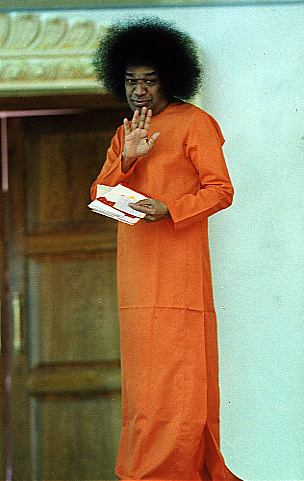Once, Krishna's
wife Ruk-mini served a glass of steaming hot milk to Radha, His
childhood sweetheart. The moment Radha took a sip of the milk,
Krishna's feet got blisters. A smiling Krishna explained that
Radha's devoted heart enthroned his feet and so, on her drinking
the hot milk, His feet got burnt.
This power of
devotion symbolises God's response to a devotee's deep love. In
the Srimad Bhagavatam, Krishna says: "Many are the means described
for the attainment of the highest goal... but of all, love is the
highest; love and devotion that make one forget everything else;
love that unites the devotee with me... as all earthly pleasures
fade into nothingness."
The path of
love is consi-dered supreme because it is wholly selfless and
entails the total erasing of self for the love of the supreme
Self. The chains of maya bind us. The jnani's strength and
knowledge breaks the chains; the bhakta on the other hand, becomes
so small and ego-less, he slips through the chains. In bhakti, the
mind melts in love for God and so is dissolved. In jnana, the mind
is mastered and overpowered by the force of wisdom.
Sri Sathya Sai Baba
says: "Love is the most powerful thing in the world... All the
yogas are included in the path of love, and whoever attains this
love, attains God."
Mystics and
saints of all religions have testified to the glory of supreme
love. ‘‘It is the power that moves the sun and other stars." said
Dante. According to scriptures, God created this universe for
love and that love is the very purpose of our existence. Love
confers ananda and softens the grind of mundane existence.
Tyagaraja sang:
"Is there greater bliss O God, than to dance, to sing to you, to
pray for your presence, and unite with you in my mind?" The Narada
Bhakti Sutras describe bhakti as a transcendental experience of
bliss, in which the ego is completely dissolved and absorbed in
the divine.
Divine love is
untainted by any motive. Divine love is transitory, a pale
reflection of the real thing. But love for God is unchanging and
eternal. Worldly love is erratic and subject to change; Divine
love is flawless, it is ever charged with its own energy. It is
nitya nutanam or ever-new.
Like God, who
is limitless, His love is also without boundaries and
ever-expanding. The love of the gopis for Krishna is cele- brated
in our scriptures because it was of this exalted nature. It
transcen-ded mind and body and touched the soul.
The Sufi saint,
Bayazid- al-Bistani, expressed it thus: "A single atom of the
love of God in a heart is worth more than a hundred thousand
paradises." Sufi literature and music is rich with the rapture
that characterises devotional love. The Christian mystic Richard
of Saint Victor said: "The whole system of human reasoning
succumbs to that which the soul perceives of the divine light;
when the soul is raised above itself and ravished in ecstasy."
To attain this
state, how-ever, you have to pay a price. Mirabai, the 16th
century saint-poet, sang: "Kanha, the price He asked, I gave.
Some cry, ‘tis great, and others jeer, ‘tis small — I gave in
full, weighed to the utmost grain, my love, my life, my soul, my
all..." As mystics have testified there is peace and fulfilment
in devotion that nothing else can bring. Chaitanya Maha-prabhu
said: "I pray not for wealth, I pray not for honours, I pray not
for pleasures or even for the joys of poetry. I only pray that
during all my life, I may have love: that I may have love to love
Thee."

